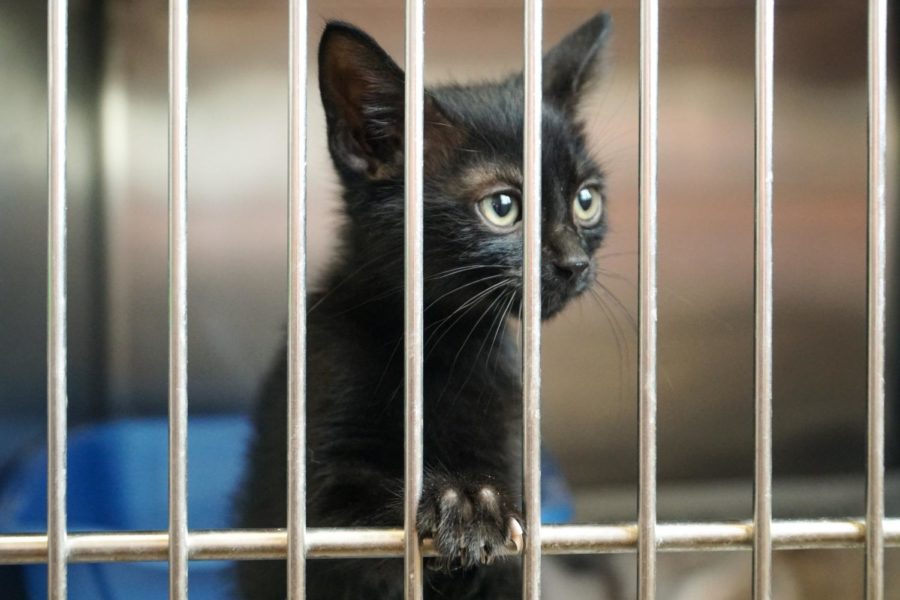Student activists spread awareness about shelter animals
Adopt Don’t Shop is a student organized campaign aimed at spreading awareness on the benefits of adopting pets.
Students have created their own service project and campaign, “Adopt Don’t Shop,” as a part of the learning and leadership sciences minor.
The minor encourages students to build on their leadership skills while also focusing on what they can contribute to society. Under this minor, students are required to complete a service learning project that will help educate and support the community.
This year, the four students have come together to develop the “Adopt Don’t Shop” campaign. Its purpose is to provide college students, in particular, with all the information they might need when considering adopting an animal.
With the number of homeless pets rising, this campaign is spreading awareness of what to expect when adopting, deciding if a pet is right for you, primary care for pets and what opportunities there are for people unable to adopt.
“We felt like there was just not enough education out there over responsibly owning a pet in college,” said Emma Debold, a senior majoring in advertising. “There are a lot of people who, you know, get pets or adopt pets, especially dogs, in college and don’t understand the responsibilities behind it. Then along with that came our interest in mental health and emotional support animals.”
Debold said they have partnered up with ISU Police’s therapy dogs and hosted two events on campus to inform students on how to give adopted pets a good home.
“They also have a program specifically at the ARL [Animal Rescue League] where you can, for lack of better words, rent a dog for a day,” Debold said. “So, kind of get the dogs out of the shelter, take them on walks and bring them out. It’s really popular, especially in the summer. I know a few people that have taken their dogs to Ledges State Park and just have gotten them out of the shelter environment.”
Debold’s own experience adopting a pet was very smooth, she said, although there is a lot of consideration that goes into the decision.
“I just recently adopted a cat from the Animal Rescue League, and he is considered my emotional support animal,” says Debold. “The process was really seamless, the people there are super sweet, and, you know, there’s a lot that has to go into legally being considered an emotional support animal.”
Hunter Stover, a junior in animal ecology, said there is a lot of research involved when thinking about adopting a pet. Food prices, vet checkups and temperament all come into play. Not every animal will be the same, especially sheltered animals that have come from different homes.
“Sometimes, it can be something as simple as an owner passed away, and that’s why the dog is there, or it’s an abuse or neglect situation, and that’s kind of why the animals ended up there or, you know, whether they had gotten taken away from a breeder who wasn’t taking care of them,” Stover said.
Stover said this is an important aspect to consider when taking a sheltered animal home. A high percentage of animals end up back in shelters after being taken home due to their potential temperament. The LLS students’ service learning project is helping college students understand the impact of these animals’ environments when being taken home.
Students with the LLS minor have partnered with Student Wellness and Student Counseling Services to introduce students to many different available resources. Even if a student is not ready to adopt an animal now, they say these resources are always available and useful to have.
“We recognize that every student can’t have a dog,” said Chelsea Larsen, a senior in animal science. “That’s not possible in college, so, just allowing students to be able to sign up for more information about volunteer opportunities within the ARL, and just ways to kind of learn more about pet adoption and take those resources and have them in their back pocket for the future.”
For more information on pet adoption and the “Adopt Don’t Shop” campaign, students can follow this link or contact Leif Olsen, the instructor for the learning and leadership sciences minor ([email protected]).
Your donation will support the student journalists of the Iowa State Daily. Your contribution will allow us to purchase equipment, send our student journalists to conferences and off-set their cost of living so they can continue to do best-in-the-nation work at the Iowa State Daily.














Mike | Oct 29, 2022 at 11:45 am
Trying to help get pets adopted so they’re not euthanized, yet those pets come with adoption fees that are in the hundreds of dollars? What a scam.